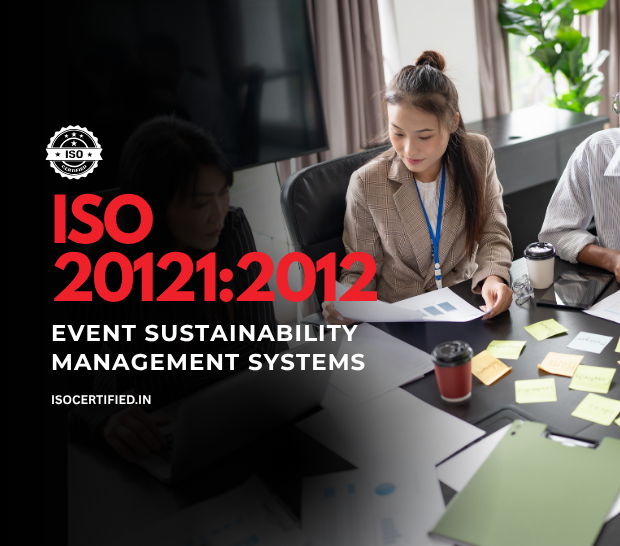- Globally Recognized Certification
ISO 20121:2012 - Event Sustainability Management Systems
ISO 20121:2012 Certification establishes sustainable event management systems minimizing environmental impact, promoting social responsibility, and ensuring economic viability throughout event planning, execution, and legacy. This standard provides framework for integrating sustainability into all event phases from venue selection through post-event evaluation and community benefit delivery.
Request A Free Quote
What is ISO 20121:2012 – Event Sustainability Management Systems Certification
ISO 20121:2012 Certification is a comprehensive management system standard designed for event organizers, venues, suppliers, and stakeholders to systematically address sustainability throughout event lifecycles. This certification covers environmental considerations including waste reduction, carbon footprint minimization, energy efficiency, water conservation, and biodiversity protection; social aspects encompassing accessibility, community engagement, local economic benefit, fair labor practices, and cultural respect; and economic sustainability ensuring financial viability while maximizing positive community legacy. The standard requires identification of sustainability issues specific to each event, establishment of measurable objectives, stakeholder engagement, and continuous improvement mechanisms.
The certification process mandates development of sustainability management systems with documented policies, procedures, and responsibilities covering supply chain sustainability, venue selection criteria, transportation planning, catering and procurement standards, waste management protocols, and communication strategies. Certified organizations must demonstrate stakeholder consultation, risk assessment, monitoring systems, corrective action procedures, and post-event evaluation measuring sustainability performance against objectives. ISO 20121:2012 compliance ensures events create positive lasting impacts while minimizing negative environmental and social consequences across planning, delivery, and legacy phases.

- Benifits
Key Benefits of ISO 20121:2012 Certification
This certification reduces environmental impact and operational costs, enhances brand reputation and stakeholder engagement, demonstrates corporate responsibility, and meets sustainability requirements increasingly demanded by sponsors, venues, and attendees.
Environmental Impact Reduction
Minimize carbon emissions, waste generation, and resource consumption through systematic sustainability practices that protect ecosystems and communities.
Cost Savings Achievement
Reduce operational expenses through efficient resource utilization, waste minimization, energy conservation, and optimized procurement reducing overall event budgets.
Brand Reputation Enhancement
Differentiate events through demonstrated sustainability commitment that attracts environmentally conscious sponsors, participants, and media coverage generating positive publicity.
Stakeholder Engagement Improvement
Build stronger relationships with communities, sponsors, suppliers, and attendees through transparent sustainability practices and meaningful legacy creation.
- Standard Process
Your Path to ISO Certification
Four straightforward steps to achieve ISO certification: consultation, documentation, payment, and certificate delivery—all managed remotely for your convenience.
Free Consultation
Connect with our ISO experts to discuss your certification needs and requirements.
E-mail Documents
Submit your organization's documents and information securely via email.
Make Payment Online
Complete your payment conveniently through our secure online payment gateway.
Get ISO Certificate
Receive your internationally recognized ISO certification upon successful audit completion.
- Which Industries?
Who Needs This
Event management companies, conference organizers, sports event planners, festival producers, and venue operators committed to sustainable practices require ISO 20121:2012 certification. Organizations bidding for major events with sustainability mandates or serving environmentally conscious clients benefit significantly.
Event Management & Production
Sports & Recreation Events
Conference & Exhibition Services
Festival & Entertainment Production
- Ongoing Requirements
Compliance & Maintenance
Post-certification, organizations must fulfill ongoing requirements including annual surveillance audits, internal reviews, and recertification to maintain their ISO certificate validity.
Annual Surveillance Audits
Certification bodies conduct yearly audits to verify continuous compliance with ISO standards and ensure your management system remains effective and up-to-date.
Recertification Every 3 Years
Complete recertification audit required every three years to renew your ISO certificate and demonstrate sustained commitment to quality management excellence.
Internal Audits & Reviews
Regular internal audits and management reviews must be conducted to monitor performance, identify improvements, and prepare for external certification audits.
Documentation & Training Updates
Maintain current documentation, update procedures for process changes, and provide ongoing training to employees on ISO requirements and their responsibilities.
